10 Lessons about Life, Literacy and Learning

When I was a teenager, I spent much of my free time and weekends playing tennis with my best friend. When weather permitted, we would bike to neighborhood courts and play for hours. It was free, it was fun, and all that practice turned us into darn good players.
I continued to play for the next few decades and then stopped. Who knows why? I got busy raising a family, working, writing, and following other pursuits.
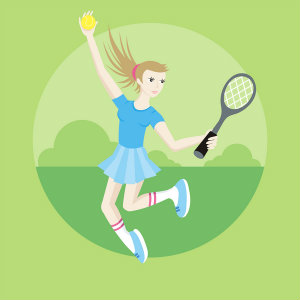
My granddaughter, like so many of her peers, prefers text messages, Instagram, Snapchat and the like – Facebook, email, and talking on the phone are relics from her past. Her dad had told me, “She’ll play tennis with anyone,” so I didn’t flatter myself when she accepted all my invitations, but I had my pride.
I did want her to see me as a competent player. So I joined the same local, public tennis club where my granddaughter and family played. I treated myself to private lessons every other week and took up tennis again in earnest.
The ruse worked in ways I hadn’t expected. I did get closer to my granddaughter and that has been rewarding for us both, but the main benefits have been more far-reaching and surprising. What I learned has made me think more deeply about teaching, learning, and living.
- It’s never too late to improve.
Even though I hadn’t been on a tennis court for over 25 years, my tennis playing got a lot better, even after just a few months of occasional lessons and practice. My desire to be a decent player propelled me to invest full mental and physical energy. I pushed myself, and though I was badly out of shape, I did not get discouraged. Small improvements that were named and noticed by my teacher spurred me on.
- Having fun makes you feel good.
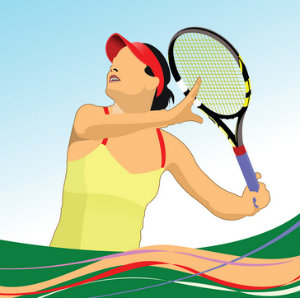
- Doing something for yourself is a luxury and a necessity.
Like you, I don’t take much time to treat myself to things that are just for me. Life’s demands and guilt routinely intervene. So I was amazed how marvelous it felt to indulge myself in a pleasurable pursuit that was purely personal. I loved taking those tennis lessons and having one-on-one time with a teacher dedicated to helping me improve.
Even being stuck in rush-hour traffic on my way home did nothing to dampen my spirits. Following a pleasurable, self-chosen pursuit continues to lift my spirits and give me energy to deal with the “hard stuff” life offers.
- Having an excellent coach makes all the difference.
When I signed up for lessons, I got the luck of the draw and wound up with a superb teacher. As a skillful coach, she gets the balance right between praising, nudging, demonstrating, practicing, supporting, and letting go. We start off each lesson with easy practice, rallying the ball back and forth, warming up with familiar volleys before adding any challenges. When I hit the balls well, she lets me know.
As needed, she stops, shows, and/or explains what modification or specific moves would help me play more effectively. Her tone and demeanor are always kind, nonjudgmental and encouraging, which makes it easy for me to try again and want to do better. She is exactly the kind of teacher I try to be and want for all children.
- How you follow through determines the end result.
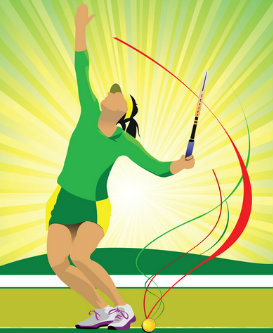
I’ve learned that starting well is insufficient; what happens all the way through the act of doing determines whether or not we meet success.
- Informing your practice doesn’t require a rank or rating.
It’s common practice at our pubic tennis club and other similar clubs that players are put into categories that define them by skill levels. As a practical matter, this makes sense for group lessons so players are matched with those with similar abilities.
Even so, for adults, and especially for kids, competitive rankings can be problematic. For some, having a lower rating translates to “less capable” rather than to “moving forward appropriately.” Even students placed at advanced levels stress out about the extreme competition and the pressure to maintain their status. The joy then goes out of the game.
- Avoid overreaching.
I recently took a serious fall while playing tennis with my son and landed all my weight on my dominant right hand. While x-rays revealed no break, I had severe ligament damage in several fingers and a near-dislocated joint. The healing process has been slow and humbling; the fall could have been avoided.
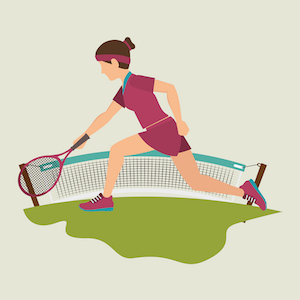
Probably all of the above. How often do we add a new initiative or accept a new challenge to our already too-full plates—in schools, in classrooms, in our lives—even when we know better? Recovery can be painfully slow.
- Invest in excellent resources.
When I took up tennis again, I hadn’t given much thought to the equipment I’d need to play well. I already had a racquet purchased secondhand and a pair of old athletic shoes so I made do with those. I learned that you actually need shoes that are made for playing tennis, and not having those shoes may be part of why I tripped.
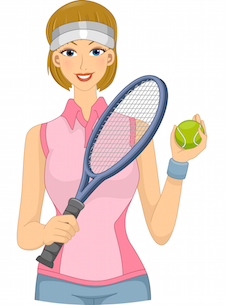
- Relax your grip.
“Relax your grip” may be the best advice my tennis coach gave me. Especially after the fall, I felt like I was holding on for dear life when I picked up the racquet again. My fingers were wrapped in protective tape and I had about 65% mobility in my hand. “Relax your grip” forced me to slow down, take deep breaths, and loosen up—all of which resulted in being more relaxed and playing better.
Isn’t that true in all aspects of our lives? Holding on too tight—to people we love, to our students, to our families—doesn’t work out so well for us or for them.
- What you’ve truly learned stays with you.
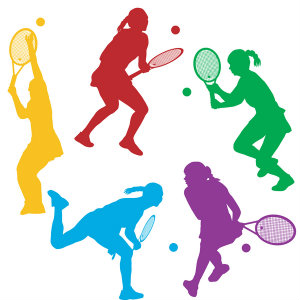
How was it possible that I had no loss in skill? I think that when we are taught well and deeply on topics we are passionate about, learning sticks. Also, while choice and deliberate practice matter a lot, perhaps most important of all, joy matters. It was the remembered joy of playing that gave me the impetus and will to play again even knowing new missteps were bound to occur.
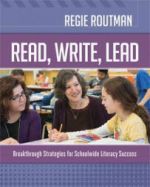
Her latest book, Read, Write, Lead: Breakthrough Strategies for Schoolwide Literacy Success (ASCD, 2014) focuses on the critical role of instructional leadership in creating strong literacy programs. Her next book, Literacy Essentials: Engagement, Excellence, and Equity for ALL Learners, will be published by Stenhouse in early 2017.


































And I thought tennis was just a way to meet a member of the opposite sex!
Good article, Regie. Brava!
Regie,
I love this…………..even more excited about my time golfing with my granddaughter now. And you know what? I even got into a BLOG which I just NEVER do. Wonderful to stretch oneself. Sure enjoyed your company, as always.
Regie, thanks for sharing your life lessons through your personal tennis story. I especially like “avoid overreaching” since I am now once again on crutches for my right leg having overdone the mountain hiking in the Redwoods and Crater Lake (you might remember I went thru this with the leg left about 1 1/2 years ago.) I need to heed your advice!
Pat Johnson